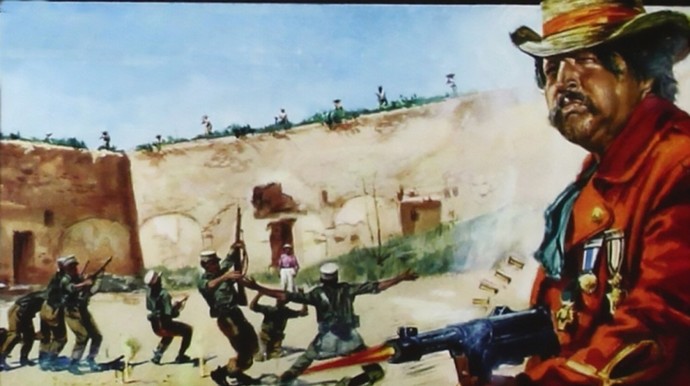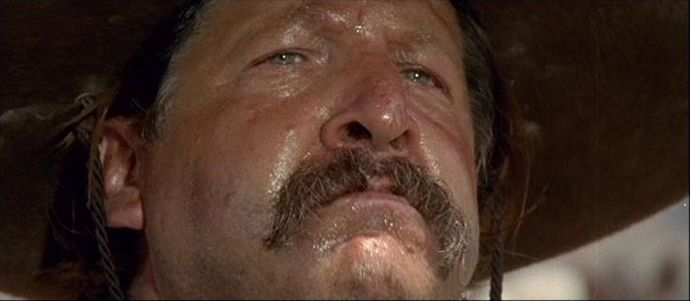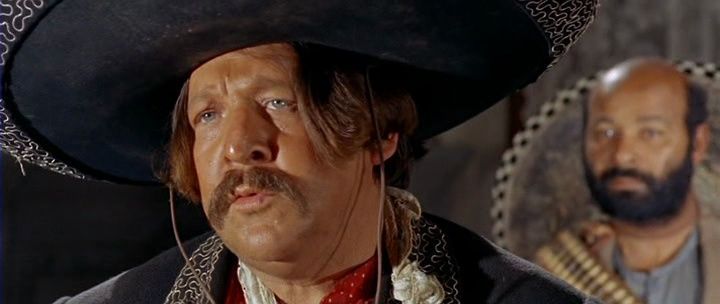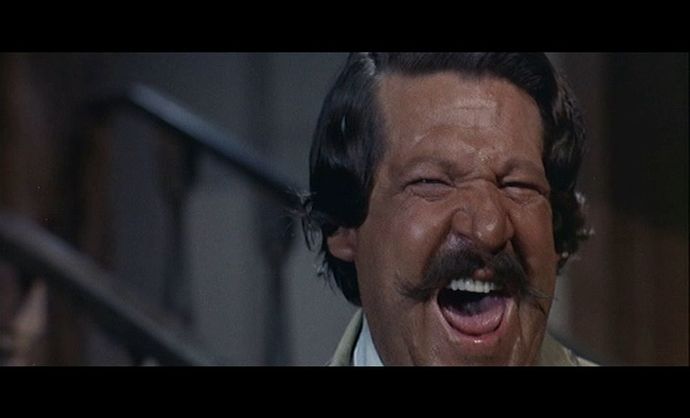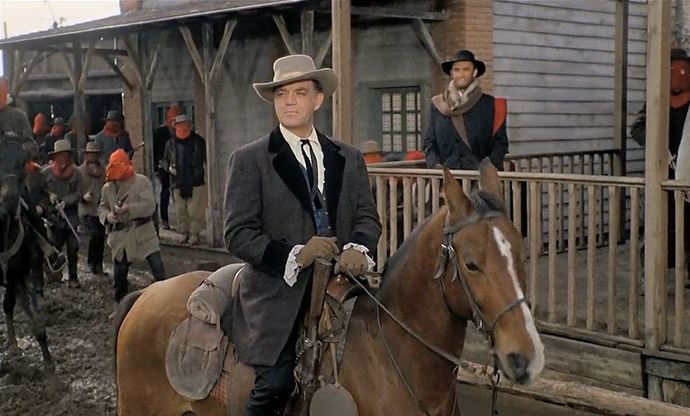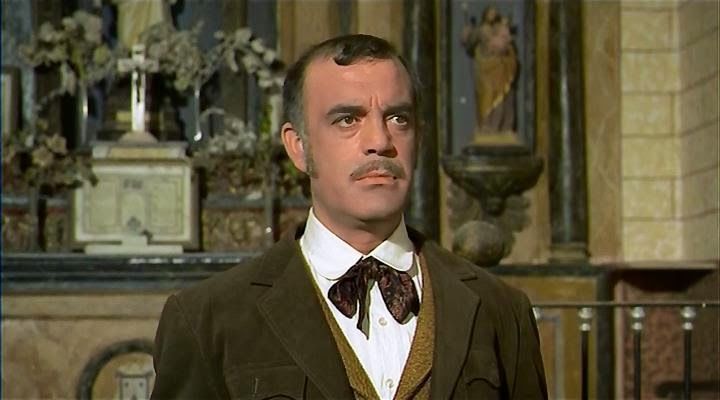The Italian and Spanish Westerns have had the pleasure of creating some of the finest baddies to grace the Western genre as a whole, but the two actors to hold the distinction of creating the architype for the villainy of the spaghetti westerns were the Spanish actors Fernando Sancho and Eduardo Fajardo.
Fernando Sancho became the staple image of the Mexican Bandido, a role he would play for the majority of his time in the genre. Having begun his time in the genre as a likable rouge in such early gems as *[Antes Ilega la Muerte] (Antes llega la muerte - The Spaghetti Western Database) ( The Seven from Texas ) and *[L’Uomo Che Viene da Canyon City] (Uomo che viene da Canyon City, L' - The Spaghetti Western Database) ( The Man from Canyon City ), it wouldn’t be until his turn as the main villain in *[El Sabor de la Vengaza] (Sabor de la venganza, El - The Spaghetti Western Database) ( The Pitiless Three ) where Sancho would find his knack and place within the Euro Wild West. A charismatic and big & burley type of a man, Sancho’s straight to the point of his schemes, and smiling/laughing menace became the hallmark of what other actors would use as the basis of their performances cast as bandits. Sancho’s bandits were often more lighthearted in their villainy, making them love to hate characters, audiences appreciating the badness, but sometimes finding redeemable qualities in them too. Characters like Sancho in *[Una Pistola per Ringo] (Pistola per Ringo, Una - The Spaghetti Western Database) ( A Pistol for Ringo ) (1965), Sanchez in *[Per il Gusto di Uccidere] (Per il gusto di uccidere - The Spaghetti Western Database) ( A Taste of Killing ) (1966), and Gordo Watch in [Arizona Colt] (Arizona Colt - The Spaghetti Western Database) (1966), perfectly embodied Sancho’s style of guys fans knew were bad and treat them as the bad guys they should, but at the same time could like them as much as the hero. Four notable exceptions of pure villainy from Sancho were as Esteban Fuentes in *[Il Ritorno di Ringo] (Ritorno di Ringo, Il - The Spaghetti Western Database) ( The Return of Ringo ) (1965), El Chacal Sancho in *[Sette Dollari Sul Rosso] (Sette dollari sul rosso - The Spaghetti Western Database) ( Seven Dollars on the Red ) (1966), Pancho Corrales in *[Los Buitres Cavaran tu Fosa] (Buitres cavarán tu fosa, Los - The Spaghetti Western Database) ( And the Crows Will Dig Your Grave ) (1971), and Ramon Sartana in *[Los Diligencia de Los Condenados] (Diligencia de los condenados, La - The Spaghetti Western Database) ( Stage Coach of the Condemned ) (1970). These characters were far more ruthless in their behavior, with little to nothing of the qualities people liked in Sancho’s other roles.
*(I have heard on the SWDb that Sancho’s role as Stardust Vasquez in [10,000 Dollari per un Massacro] [ 10,000 Dollars for a Massacre ] is viewed as his finest hour in the genre, but I have yet to see it, hence why it gets this asterisk)
Sancho also played many a good guy within the SW genre, usually as the hero’s friend, but it is his villains and his ambiguous supporting characters that he will be forever remembered for.
Eduardo Fajardo is the SW equivalent of a 1940’s Hollywood boudoir villain: finely dressed, slimy, arrogant, lecherous, former and/or disgraced military men, and ego maniacs. Fajardo’s villains often had little to no morality, were power mad, and dedicated to destroying what they felt was inferior to their way of life, racism and bigotry often being a strong characteristic. Major Jackson in *[Django] Django - The Spaghetti Western Database) (1966) was the first, and the epitome of these types of characters that Fajardo would enjoy playing for the majority of his SW career. Other characters of this mold include Col. Garcia in *[Il Mercenario] (Mercenario, Il - The Spaghetti Western Database) ( The Mercenary ) (1969), Acombar in *[Un Straniero de Paso Bravo] (Uno straniero de Paso Bravo - The Spaghetti Western Database) ( A Stranger in Paso Bravo ) (1968), Major Droster in *[Shango, la Pistola Infallible] Shango, la pistola infallibile - The Spaghetti Western Database ( Shango ) (1970), and Tiny in *[Sette Pistole per un Massacro] (Sette pistole per un massacro - The Spaghetti Western Database) ( Seven Pistols for a Massacre ) (1967). Fajardo also made stellar grizzled baddies, whether Mexican Bandidos or general outlaw gunmen, often untrustworthy and out for themselves, their loyalty to their own men very questionable. His top two performances as these types of characters are as ‘Colonel’ Fernando Ferreras in *[Gentleman Jo…Uccidi] ( https://www.spaghetti-western.net/index.php/Gentleman_Jo…_uccidi) ( Gentleman Killer ) (1967) and as Russell Murdock in *[Una Bara per lo Sceriffo] (Bara per lo sceriffo, Una - The Spaghetti Western Database) ( A Coffin for the Sheriff ) (1965). He plays this type of character to a lesser extent in *[Tutto per Tutto] (Tutto per tutto - The Spaghetti Western Database) ( Go for Broke ) (1968).
An exceptional performance was as Don Jaime Mendoza in Il Tempo degli Avvoltoi (The Time of Vultures) (1967). This character had quite a bit of badness in him, but Fajardo gives audiences a nice surprise by revealing the character to be a dedicated husband and employer willing to give up all his wealth to save his wife and keep his employees from getting needlessly killed. This part proved Fajardo could also play good men, but was generally at his best playing the baddie fans loved to loath.
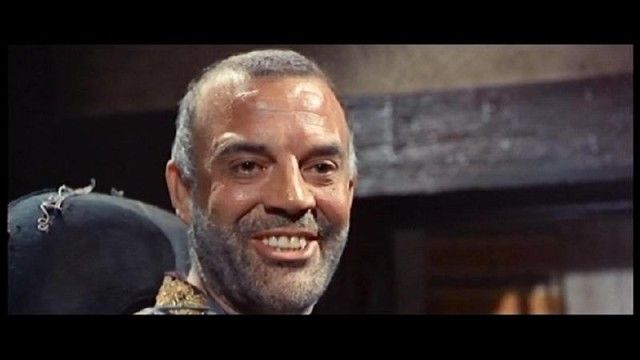
Noah Beery Sr. and Mantague Luv were the villains of villains of the Silent Film Era (1), and Fernando Sancho and Eduardo Fajardo enjoy a similar moniker in the Spaghetti West.
(1) Everson, William K. The Bad Guys: A Pictorial History of the Movie Villains, 1974 pgs. 9-14
